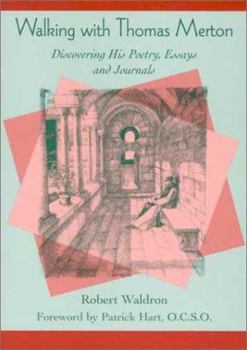Walking with Thomas Merton: Discovering His Poetry, Essays, and Journals
Select Format
Select Condition 
Book Overview
Discovering the Unknown Merton Merton as poet is one of the least known and most under-appreciated aspects of his life. In preparation for giving a retreat, the award-winning author re-examined... This description may be from another edition of this product.
Format:Paperback
Language:English
ISBN:0809140586
ISBN13:9780809140589
Release Date:January 2002
Publisher:Paulist Press
Length:117 Pages
Weight:0.45 lbs.
Dimensions:0.4" x 5.0" x 7.0"
Customer Reviews
2 ratings
Well I Found The Book to be Excellent
Published by Thriftbooks.com User , 20 years ago
This book is made up with entries Waldron made in his diary while he was preparing for a Merton retreat at St. Stephen Priory in Massachusetts years back. Robert Waldron considers Thomas Merton to be , more or less, his spiritual mentor. He has always been stunned with Merton's impeccable honesty and openness he was known for writing with. At one point, Waldron refers to the contemplative's entire oeuvre as " a word icon," guiding an innumerable amount of people to a deeper rapport with God.A key premise in Merton's writings is paying attention. He depicts it as "arduous as weight-lifting, but the more we do it, the easier it gets. It is a matter of will and exercise." Merton on no account felt isolated when he was encircled by all of his books. He was able to find spiritual nourishment in masters like Chuang Tzu or even William Faulkner's "The Bear." Waldron's final appraisal of Merton is, as you might expect, his boundless interest with contemplation. Merton once said, "Contemplation is essentially a listening in silence."All in all, Waldron's keenness for Merton's worth as a spiritual guide is lucidly communicated to us here. He covers his poetry, life, and essays thoroughly and with an appreciation you can simply witness as you read the book. Waldron truly does and did admire Thomas Merton greatly. And after all, didn't we all?
Preaching Merton's words
Published by Thriftbooks.com User , 22 years ago
In "Walking with Thomas Merton," the teacher, lecturer and author Robert Waldron allows us to follow him through a summer as he prepares a presentation on the works of the Trappist poet for a September retreat. It is a journal-like chronicle of Waldron's contact with one of the more energetic minds of the age, a glimpse into the impressions of a humbly astute reader as he encounters Merton's thought in poetry and prose.The book assumes a familiarity with the works of Merton, but readers who have encountered only two or three Merton books need not fear: Waldron's style is accessible and congenial, sometimes surprisingly, pleasantly conversational. He speaks as one reader to another, one spiritual explorer to another, confident that we will catch his enthusiasm not only for Merton, but for poetry in general.As we see Robert Waldron sift through the compendious opus of the celebrated monk, making choices about which poems to present in his lecture, which portions of the prose to incorporate, we see him remembering when he first encountered Merton, we get brief commentary on how the work affected him (we echo his praise for the poetic prose in "A Vow of Conversation" and share his befuddlement at the attempted innovation of "Geography of Lograire"); we receive a sense of Merton's influences, and are pointed in the direction of his kindred spirits. He is compared, briefly and sagely, to another Catholic author and diarist, the late Henri Nouwen -- the differences being highlighted, as well as the similarities.The life of Merton is generously assessed: the monk is lauded, justly, for his refusal to abandon his Cistercian life at a time of much turbulence for Church, nation, and the monk himself. His explorations into Buddhism are seen as evidence of a magnanimously ecumenical spirit; his affection for a Louisville nurse, as a humanizing moment that broadened and made tender the heart and soul of the monk. (We are offered a small but moving excerpt of one of the "Eighteen Poems," written during the days when monk and nurse were often in each other's company. It might be worth noting that "Learning to Love," volume 6 of Merton's journals, contains three or four excellent poems from this time.) Merton's sometimes uncritical enthusiasm for the politics of the left is not dealt with extensively, as Waldron's concern here is with the contemplative, creative, and poetic aspects of Thomas Merton's life-work."Walking with Thomas Merton" is the culmination of a lifelong enthusiasm for Robert Waldron, and he manages to convey, charmingly and disarmingly, why Merton's poems and prose fascinate him, and just might fascinate us. Merton's poems (and all fine poetry, as Waldron can attest, being an English teacher) cause us to pause from the hustle and hullaballoo, and gently urge us to pay attention to the minute particulars we often overlook, to go with the poet to a quiet space and re-create ourselves. Waldron baptizes (literally, immerses or plunges) himself in th





